I was recently part of a team, along with colleagues from the University of Bath and the Edge Foundation, which evaluated the impact of raising the participation age a decade ago.
We did not see much, if any, impact on post-16 participation.
We talked to students, local authorities and policy makers about their experiences of post-16 education. And there was only one topic they wanted to talk about: resits in English and maths.
To give them their proper name, the maths and English condition of funding requirements were introduced in 2014. All pupils[1] who had not achieved grade 4 in maths (or English) by the end of Key Stage 4 were required to study those subjects as part of their post-16 programme.
But how many pupils actually enter a qualification in maths or English post-16? Let’s take a look.
Data
To begin with, we use Key Stage 4 data for 2022 relating to all pupils in state-funded schools (mainstream, special, alternative provision).
We identify a pupil’s highest grades in English (the best of language or literature) and maths.
We then use post-16 achievement data for 2023 and 2024 to identify instances where a pupil has entered GCSE English language, GCSE maths, and stepping stone qualifications in literacy and numeracy.
How many pupils resit?
In the table below we show the percentage of pupils who resit English or maths broken down by end of Key Stage 4 grade.
In total, 73,000 pupils entered GCSE English language post-16, of which 57,000 (78%) had not achieved grade 4 in either English language or English literature by the end of Key Stage 4.
85,000 pupils entered GCSE maths of which 83,000 (97%) had not achieved grade 4 by the end of Key Stage 4.
Just over half (54%) of those who had not achieved grade 4 by the end of Key Stage 4 entered a post-16 qualification at level 2 or below in English language or a stepping stone qualification. 44% entered a GCSE.
59% of those who had not achieved grade 4 by the end of Key Stage 4 entered any post-16 qualification at level 2 or below in maths. 50% entered a GCSE.
13% of those without grade 4 in GCSE English at the end of Key Stage 4 subsequently achieved grade 4 or higher by the end of 2024. The equivalent figure for maths was 11%.
Pupils who achieved grade 3 at Key Stage 4 were more likely than those with lower attainment to subsequently achieve grade 4 or above. 27% of such pupils did so in maths and 23% did so in English. This equates to around a third of those who were entered for GCSE at least once.
How many times do pupils resit GCSEs?
As we saw in the previous section, 44% of pupils who had not achieved grade 4 in English at Key Stage 4 entered a GCSE in the following two years. The equivalent figure for maths was 50%.
Of those that do enter GCSE post-16, many do so only once.
In some cases, pupils entered GCSE English or maths four or more times. Around 15 thousand entered GCSE maths three or more times.
The group who didn’t enter any qualifications consists of several subgroups, including:
- Those who studied English or maths but weren’t entered for any qualifications
- Those who did not study English or maths at all but did study post-16 (e.g. pupils with EHC plans exempted from the conditions of funding requirement)
- Those who did not participate in post-16 study at all (NEETs).
Summing up
The maths and English condition of funding requirement has been a feature of post-16 education since 2014.
Since then, pupils who do not achieve grade 4 in English (or maths) at GCSE have been required to continue studying English (or maths) post-16.
We find that 54% of pupils who did not achieve grade 4 in English entered GCSE language or a stepping stone qualification in the two years following the end of Key Stage 4.
59% of pupils who did not achieve grade 4 in maths entered GCSE maths or a stepping stone qualification.
So although it is a requirement that pupils who do not achieve grade 4 in English (or maths) at GCSE continue to study English (or maths) post-16 it does not necessarily follow that they will be entered for qualifications.
- Apart from those with an EHC plan who are assessed as not able to study towards either GCSE or a stepping stone qualification.
Want to stay up-to-date with the latest research from FFT Education Datalab? Sign up to Datalab’s mailing list to get notifications about new blogposts, or to receive the team’s half-termly newsletter.




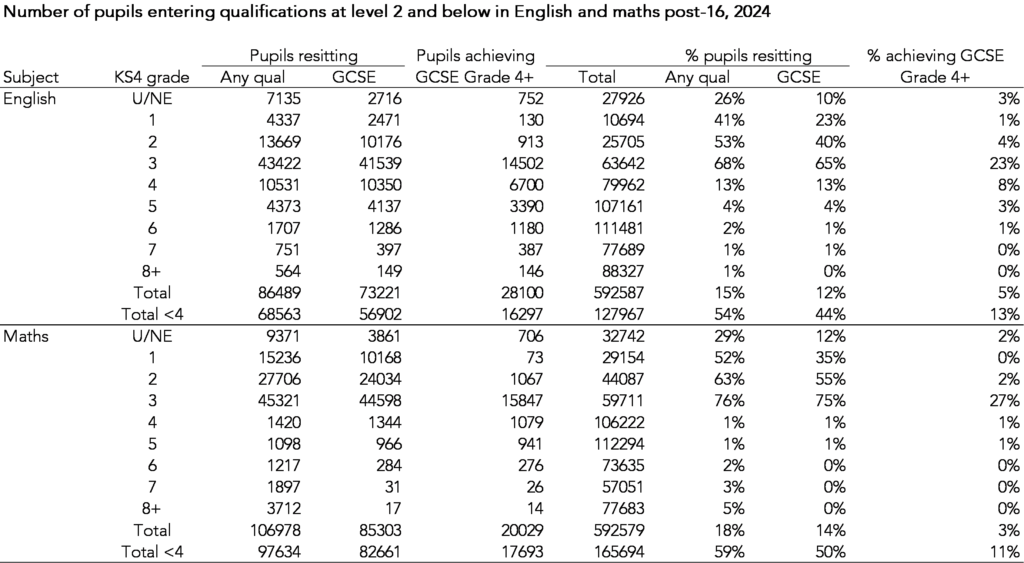
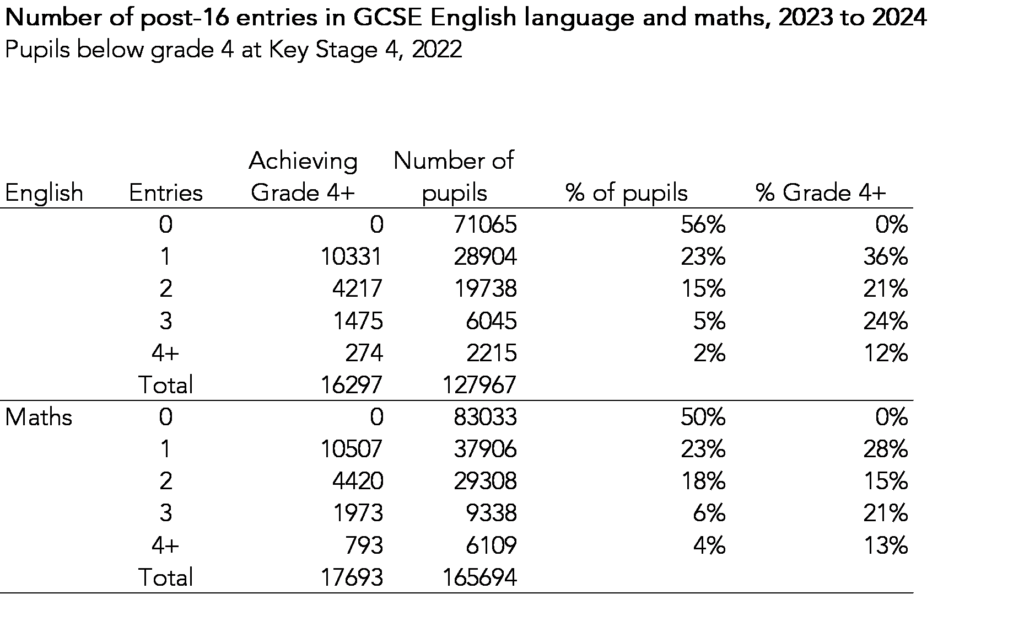
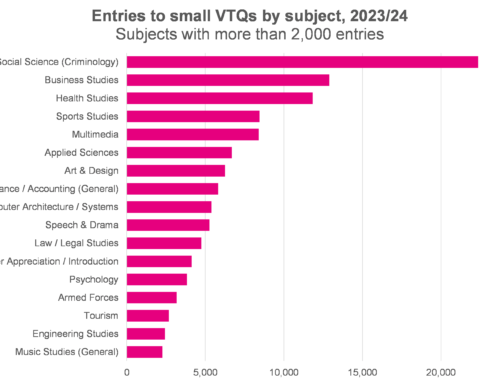
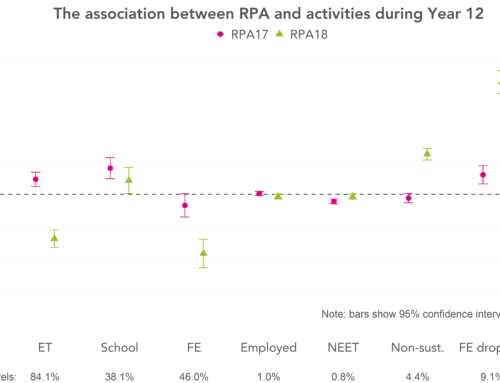
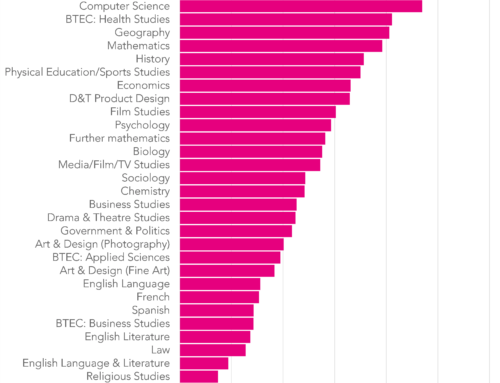

Does this data include entries for November examinations, or just the summer? Is there anything to be learned looking at the two sessions separately? It would also be interesting to see a breakdown by age (eg, Yr 12 would have only 0, 1 or 2 resits, Yr 13 would have anything between 0-4 resits). And did you find the often cited student who had resat nine times?
Hi Graham. It includes both November + Summer entries. I may well have another go at it with the 2023 (and possibly 2024) KS4 cohorts when the 2025 exam data turns up. Nine entries seems a bit much- unless you include pre-16 entries.
Great data! What’s the story of those 3712 students with grade 8+ who ‘resit’ a level 2 maths qualification? Only a handful are resitting GCSE so I’m wondering what qualification they are ‘resitting’. Is it students doing GCSE maths a year early and then level 2 additional / further maths at the normal time (would your data include these students) or are there students who get their 8+ at GCSE but have to do another level 2 qualification (like functional skills) later too?
Thanks Alex. “Resits” is a bit misleading for that group to be honest- they are largely doing AS levels- which count as both L2 and L3 quals.